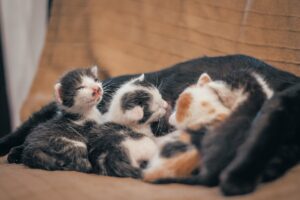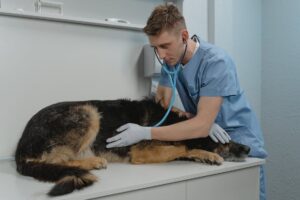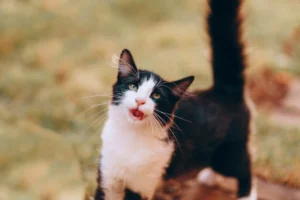Cats are known for their stealthy and silent behavior, but sometimes you may have a heavy breathing cat, a behavior that can be concerning for pet owners. Heavy breathing in cats can have a variety of causes, some of which may be serious. Understanding why cats breathe heavily and similar behavior can help pet owners take appropriate actions for their feline friends.
Why do I have a heavy breathing cat?
Cats may breathe heavily as a result of normal activity such as playing or exercising. However, heavy breathing can also be a sign of a medical condition such as heart or lung disease, or a respiratory infection. Obesity and certain breeds such as the Persian cat, can also make cats more prone to heavy breathing.
Special considerations by breed and geography
Some breeds of cats such as:
- Persian,
- Maine Coon, and
- British Shorthair
Have flat faces, which can make them more prone to breathing difficulties. These breeds are more sensitive to heat and humidity, and therefore, they tend to breathe more heavily in these conditions.
Cats living in areas with high humidity and high temperatures may breathe more heavily due to heat exhaustion or heat stroke.
Best practices for diagnosing a heavy breathing cat
- Consult with your veterinarian if your cat’s heavy breathing behavior is frequent or accompanied by other symptoms such as coughing, wheezing, or difficulty breathing.
- Keep an eye on your cat’s overall health, noting any changes in appetite, energy level, or behavior.
- Keep your cat’s weight under control, as obesity can contribute to breathing difficulties.
- Watch for other signs of distress such as open-mouthed breathing, panting, or restlessness.
It’s important to note that while heavy breathing can be a normal behavior in cats, if it’s accompanied by other symptoms such as coughing, wheezing, or difficulty breathing, it may be a sign of an underlying health concern. If you notice any concerning symptoms or if your cat’s heavy breathing behavior is frequent, it’s best to consult with your veterinarian.
Important Resources for Pet Owners:
- The American Association of Feline Practitioners (AAFP) – Offers resources on feline health, including respiratory conditions.
- The International Society of Feline Medicine (ISFM) – Provides information on feline health and wellness.
- The Feline Health Center at Cornell University – Offers a wide range of resources on feline health and behavior, including articles on respiratory conditions in cats.
Cats may breathe heavily for a variety of reasons, and it’s important for pet owners to be aware of the different causes of this behavior. Some breeds and those living in certain geographic areas may be more prone to heavy breathing due to certain factors.
By following best practices for diagnosing health concerns and consulting with a veterinarian, pet owners can ensure that they are taking appropriate actions to keep their feline friend healthy and comfortable. It’s essential to pay attention to any other symptoms that may accompany the heavy breathing behavior, and if in doubt, always consult your veterinarian.







